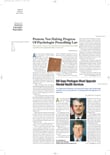Women may experience depression at any time during their lives, but they may be especially vulnerable to depression after giving birth and in old age, according to psychiatrists who specialize in women's mental health issues.
“Women have two to three times the incidence of depression as men during their reproductive years,” due in part to hormonal, environmental, and genetic factors, said Nada Stotland, M.D., M.P.H., APA secretary and a professor of psychiatry and obstetrics and gynecology at Rush University in Chicago.
Stotland spoke at APA's annual meeting in New York City last month in a symposium sponsored by the Association of Women Psychiatrists on the impact of depression on women throughout their reproductive years, regardless of whether or when women choose to have children.
Low social status, low pay, and domestic abuse, which are more likely to affect women than men, have been associated with depression, Stotland said.
Certain mood disorders are unique to women, such as postpartum depression, she noted, which occurs in about 10 percent of new mothers in North America, Stotland noted.
Widespread media attention on high-profile cases such as that of Andrea Yates, who was convicted in 2002 of drowning her five children, has piqued the public's curiosity, she observed, but many people still cannot differentiate between postpartum depression, so-called “baby blues,” and postpartum psychosis, she said.
The majority of new mothers are affected by baby blues, which “is nothing like being depressed,” Stotland said. “If you are labile and having moments of being happy and sad, people notice that you're sad—we don't tend to use labels when people are happy.”
Postpartum psychosis affects just 0.1 percent of new mothers and usually happens within days of giving birth, said Stotland. “These mothers are very agitated, confused, and cannot be calmed down—this is a medical emergency,” she said. “These mothers are at risk of doing harm to themselves or their infants.”
The onset of postpartum depression can range from a few days after childbirth to up to six months or a year afterward. Risk factors include previous episodes of depression, a difficult pregnancy, and a lack of social supports, Stotland said.
Few Understand Postpartum Plight
She noted that postpartum depression “is the cruelest type of depression you can have because few people understand or have empathy” for new mothers who are depressed.
It is not uncommon for people to make such remarks as “How can you possibly be sad? This is the happiest time of your life” or “Do you know what your cousin would give to have a healthy baby like yours?” said Stotland.
But there is evidence that the new mother's depression can have a demonstrable negative impact on the infant, Stotland said, because the mother is less responsive to the infant's needs.
Psychotherapy is often helpful to new mothers with symptoms of postpartum depression, but some may need medication. There is mixed evidence about the impact of selective serotonin reuptake inhibitors (SSRIs) on the baby's development, but “sertraline seems to get into the breast milk less” than other SSRIs, she noted.
Health Problems Contribute to Depression
As women age, a number of health problems can place them at risk for depression, according to Marion Goldstein, M.D., a professor of psychiatry at the State University of New York at Buffalo and director of the division of geriatric psychiatry at Erie County Medical Center.
“Eighty percent of women aged 65 and over have at least one chronic illness,” Goldstein said.
Medical problems and symptoms contributing to the incidence of depression in older women include chronic pain, arthritis, insomnia not explained by any type of illness, falls, bone fractures, and sensory deficits.
In addition, mild cognitive impairment that often occurs in the elderly can contribute to depression in women, she said.
Poverty, a well-known risk factor for depression, is more likely to impact older women than men, according to Goldstein. “Elderly women make up 72 percent of poor elderly people,” she said, adding that elderly women are half as likely to have pensions as men in their age group, and if they do receive pensions, the amount is half that of men.
Many elderly women with depression remain untreated, Goldstein said, because there is “suboptimal recognition of depression in primary care settings.”
If depression is diagnosed in primary care settings, there is often inadequate treatment or a failure for primary care physicians to follow up with patients after initiating treatment, Goldstein added.
As a result, elderly women with untreated depression are likely to experience decreased quality of life, worsening of daily living skills and social functioning, and an increased risk of suicide, among other problems.
It's important that psychiatrists, especially geriatric psychiatrists, cooperate with primary care clinicians to train them about mental health issues such as depression and work to reduce stigma in this area, Goldstein said. ▪
